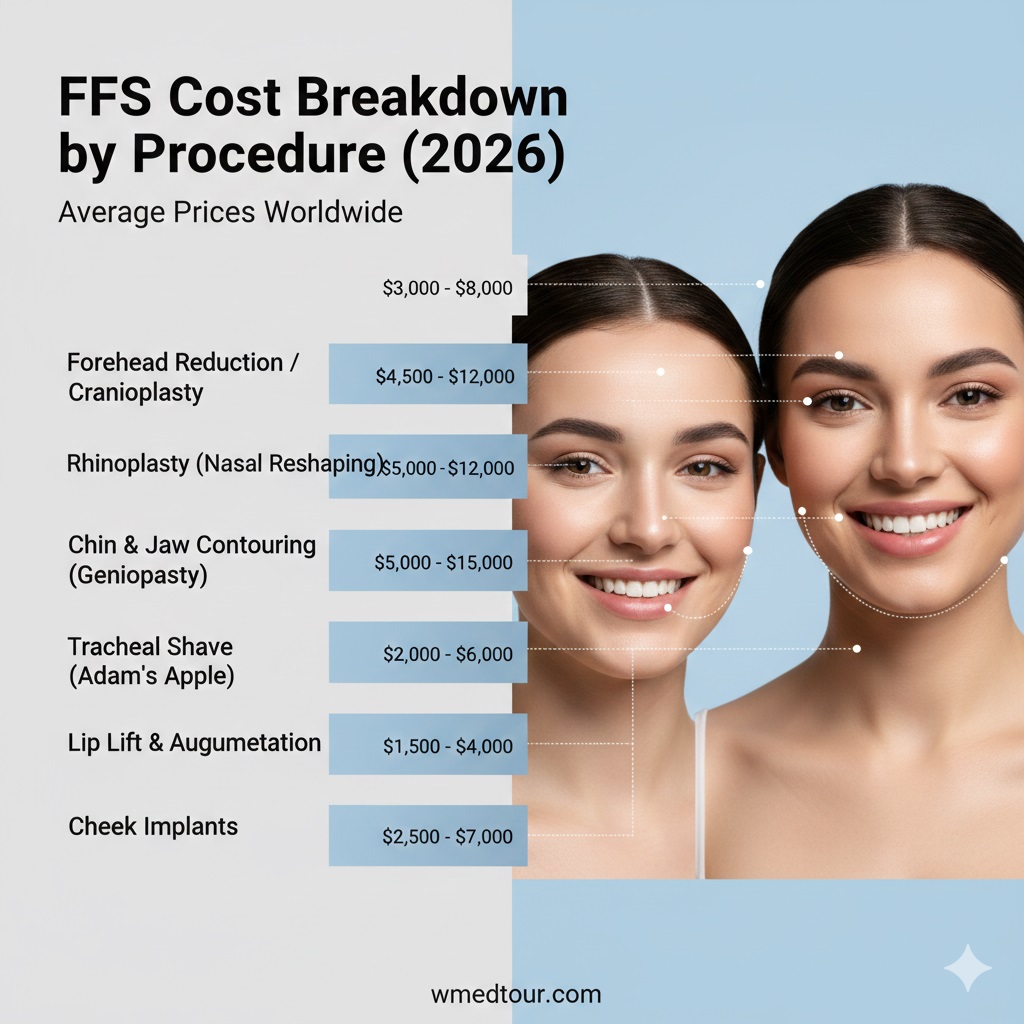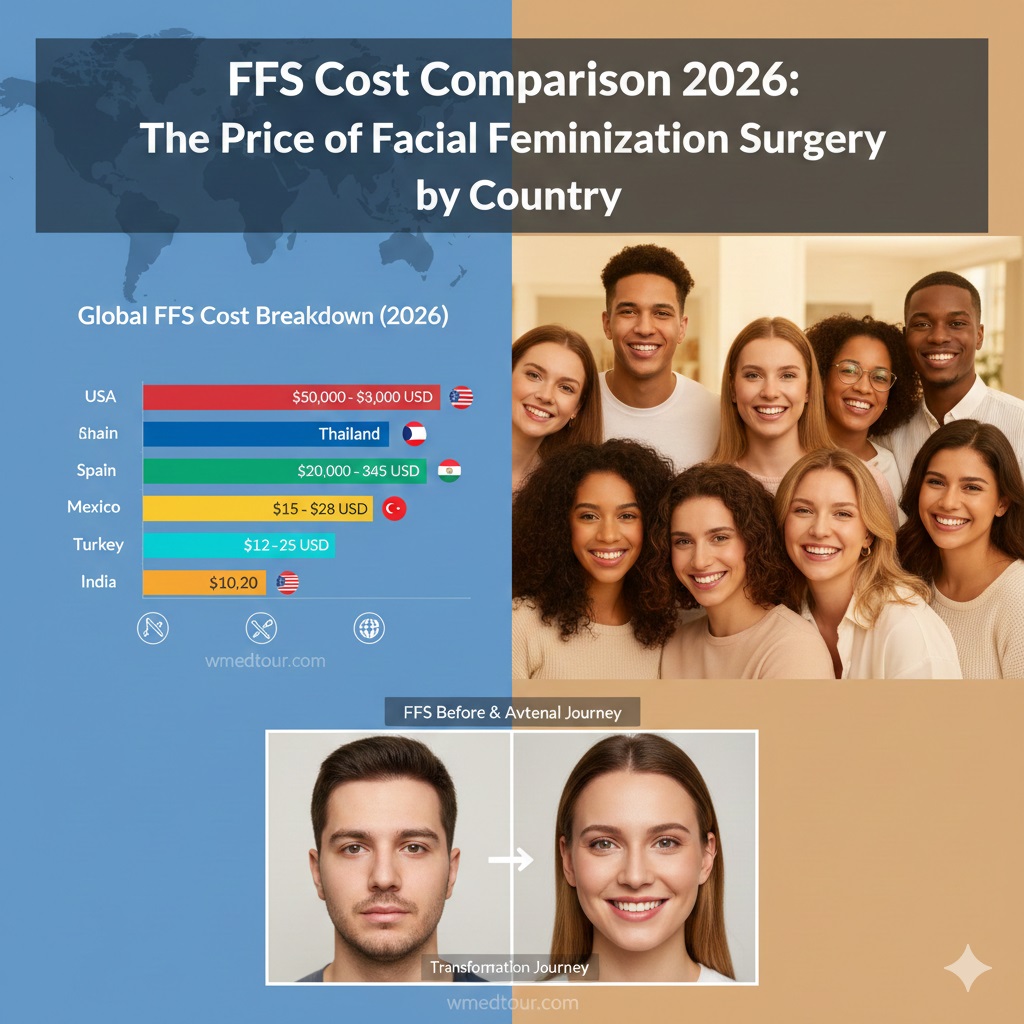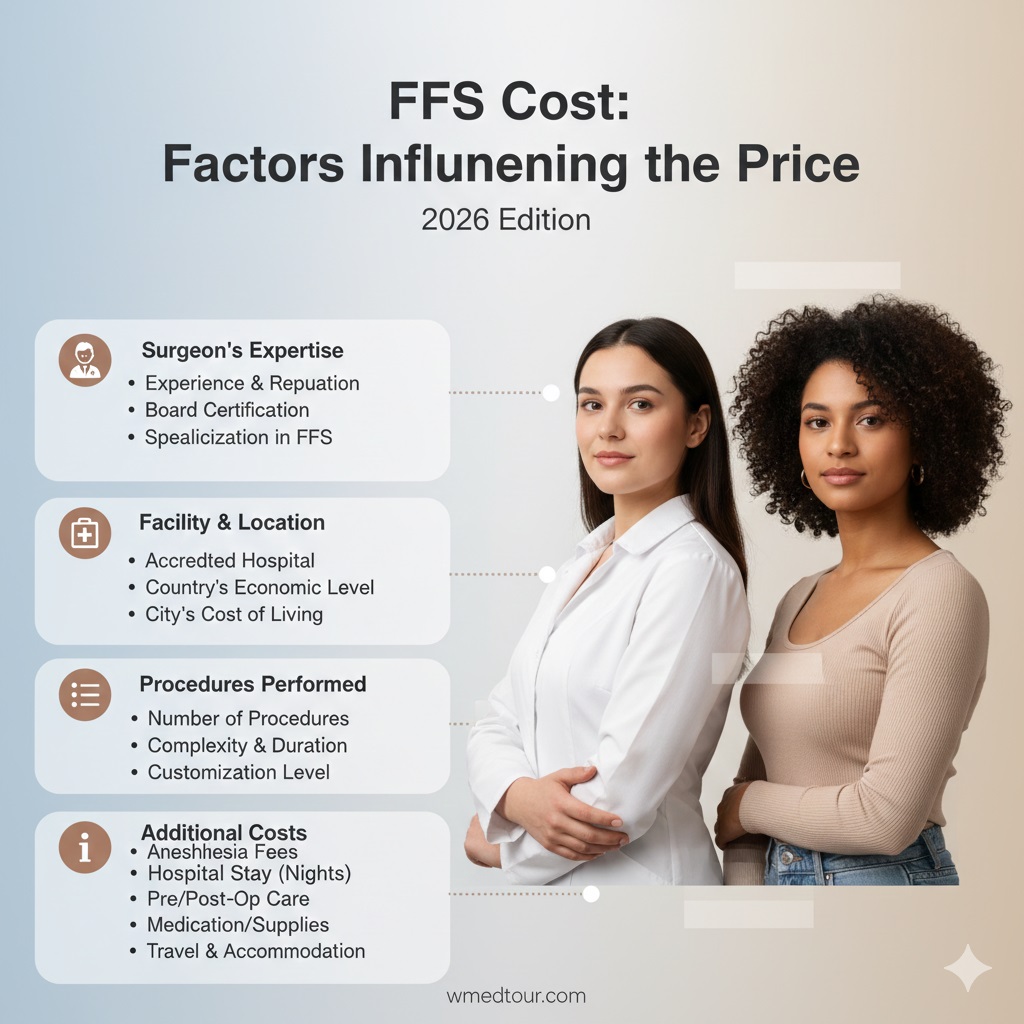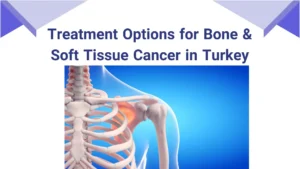Published: January 1, 2026 | Last Updated: November 25, 2025
Best Country for FFS & Hormone Therapy ⚧ 2026: The Ultimate Global Guide
For transgender women and non-binary individuals seeking to align their physical appearance with their gender identity, Facial Feminization Surgery (FFS) and ongoing Hormone Therapy (HT) are pivotal. The decision of where to pursue these procedures—and how to navigate the complex landscape of cost, quality, and legal safety—is one of the most significant choices in a transition journey. This comprehensive guide breaks down the world’s top destinations for FFS and HT in 2026, comparing the best options based on surgical expertise, affordability, legal support, and quality of aftercare.
Executive Summary: Key Takeaways for 2026
The global landscape for gender-affirming care continues to evolve, creating diverse options for patients worldwide. Based on current data and surgical trends, here are the core findings:
- Best Overall Value: Turkey. Turkey continues its rise, offering world-class, internationally trained surgeons and all-inclusive FFS packages ranging from $5,000 to $15,000 (Source: Search Results, 2.1, 1.7). Its cost-effectiveness and high quality of specialized care make it the top recommendation for budget-conscious patients seeking comprehensive surgery.
- Most Affordable Option: Iran. For patients whose primary concern is minimizing costs, Iran provides the most economically viable choice, with full FFS packages often falling between $4,000 and $8,000, and is noted for its experienced, internationally-trained surgeons. However, patients must carefully navigate the complex legal and cultural environment.
- Highest Specialized Expertise: USA & Belgium. The United States and Belgium remain benchmarks for specialized, cutting-edge surgical techniques and long-term research. While prohibitively expensive for many ($35,000 – $60,000+), they offer unparalleled access to highly renowned craniofacial and maxillofacial surgeons specializing in FFS.
- Best for Combined Care (FFS/HT/GCS): Thailand. Thailand is renowned for its decades-long history in gender-affirming care, providing excellent quality FFS and a seamless integration with GCS and HT, though prices are generally higher than in Turkey or Iran.

1. The Financial Reality: FFS Cost Breakdown by Country
Cost is the most significant barrier for most patients. The price of FFS can vary by over 1000% globally, determined by the country’s cost of living, the surgeon’s reputation, and the procedures included in the package. A standard FFS package often includes Forehead Contouring (Type III), Rhinoplasty, and Jaw/Chin Contouring.
| Country | Average Full FFS Cost (USD/EUR Estimate) | Primary Factor |
|---|---|---|
| Iran | $4,000 – $8,000 | Lowest Overhead/Currency Advantage. Extremely cost-effective due to favorable exchange rates and state support for medical tourism. |
| Turkey | $5,000 – $15,000 | Strongest Value. Low operational costs combined with internationally trained surgeons and all-inclusive packages. |
| Thailand | $20,000 – $35,000 | Established Industry. Higher costs reflect a decades-long, mature medical tourism infrastructure and high demand for experienced specialists. |
| South Korea | $25,000 – $40,000 | High-Tech Specialization. Known for advanced bone contouring and high technical skill, but costs are elevated due to modern facilities and global reputation. |
| Spain/Belgium (Europe) | €10,000 – €35,000 ($11,000 – $38,000) | Quality/Accessibility. Spain offers moderate costs (€10k-€25k), while Belgium provides top-tier, specialized surgical care at the high end (€15k-€35k). |
| United States | $35,000 – $70,000+ | Highest Cost/Insurance Dependent. Costs are highest globally, but can be managed by insurance coverage, making it feasible for those with excellent policies. |
Factors Driving Cost Variability
When assessing price, remember that you are not just paying for the procedure. You are paying for the surgeon’s experience, the hospital’s accreditation, anesthesia fees, post-operative care, and travel logistics. A lower price often means lower general labor costs in the country, not necessarily a compromise in surgical quality, especially in countries like Turkey and Iran where medical professionals are often trained in the West.
2. Surgical Excellence and Expertise: Quality of FFS Specialists
The success of FFS hinges on the surgeon’s mastery of craniofacial and maxillofacial techniques. The goal is subtle, natural-looking feminization, not just general plastic surgery. Look for surgeons who specialize exclusively in gender-affirming care.
2.1. The American and European Gold Standard
The USA and Belgium are home to pioneers in FFS, offering techniques refined over decades. Surgeons in these regions often present the longest track records and are often involved in defining the standards of care, such as those set by WPATH. While expensive, the quality of revision-free, natural results is often viewed as the gold standard. Consider these destinations for complex cases or for those requiring intricate bone work.
2.2. Emerging Global Hubs: Turkey and South Korea
Turkey has rapidly become a premier destination. Many Turkish plastic surgeons, trained in Europe or the US, have chosen to specialize in FFS, leveraging lower operating costs to offer highly competitive prices. The volume of medical tourism here ensures a high level of contemporary experience, particularly in the major metropolitan areas of Istanbul and Ankara. For example, Turkey is competitive in specific procedures like Rhinoplasty, often starting at $2,675 to $6,500.
South Korea excels in general cosmetic surgery, and this expertise translates well to FFS, especially in jaw and cheekbone contouring, offering advanced techniques and state-of-the-art facilities. Clinics like SAERO Plastic Surgery are globally recognized. However, be mindful that the high volume and speed can sometimes prioritize general aesthetic outcomes over a deeper understanding of gender dysphoria.
2.3. The Experience of Southeast Asia: Thailand
Thailand’s surgical reputation is built on decades of experience in GCS, providing a holistic understanding of transgender medicine. FFS surgeons in Bangkok and Phuket are highly skilled, and the patient-care infrastructure is exceptional. They are an ideal choice for patients planning combined surgeries (FFS and GCS), offering a one-stop-shop approach to recovery.
3. Navigating Legal, Cultural, and Aftercare Logistics
Surgery is only one part of the journey. The surrounding environment—including legal support, cultural acceptance, and aftercare quality—is crucial for a successful medical trip. Securing your Hormone Therapy supply and follow-up care is paramount.
3.1. Legal and Cultural Environment
For individuals traveling for gender-affirming care, personal safety and legal security are non-negotiable. While the USA, Spain, and Belgium offer the strongest legal protections and cultural acceptance, other regions present trade-offs:
- Iran: Despite being a state that legally supports gender-affirming surgery, its societal context is conservative. Patients need to utilize specialized medical tourism facilitators who manage all legal, accommodation, and travel aspects to ensure a safe, structured experience. Read our Complete Legal Medical Travel Guide: Iran Regulations.
- Turkey: Istanbul and Antalya are cosmopolitan centers with high levels of acceptance within medical tourism hubs. Outside of these areas, discretion may be required, but the organized nature of the medical tourism industry often shields patients. Read our Complete Legal Medical Travel Guide: Turkey Regulations.
- Thailand: Widely regarded as the most welcoming cultural environment in Asia for trans patients, facilitating a relaxed and secure recovery period.
3.2. Quality of Aftercare and Recovery
Post-operative care (aftercare) is a non-optional component of FFS. Swelling and bruising are significant, requiring an intense recovery phase of several weeks. All-inclusive packages, prevalent in Turkey and Thailand, simplify this process greatly, often providing:
- Airport pickup and private transportation.
- Dedicated recovery accommodation (hotel or specialized recovery house).
- Nurse or assistant check-ins.
- Medication and follow-up consultations.
In the US or Europe, patients usually manage these logistics and costs separately, which can add thousands of dollars to the total bill and significant stress to the recovery process. This is a crucial area where lower-cost medical tourism hubs often provide superior logistical support and specialized recovery accommodation.
4. Who is This Guide For? Choosing Your Path
Your ideal country depends entirely on your personal priorities for your transition journey, whether they are focused on cost, specialized technique, or cultural safety.
4.1. Option 1: The Budget-Conscious Traveler (Prioritizing Affordability)
For patients with strict financial limits, the focus must be on maximizing surgical quality within the lowest cost bracket. This traveler is generally willing to navigate cultural differences for the sake of accessibility.
- Top Choice: Iran ($4,000 – $8,000). This choice requires working with a reputable facilitator who understands the legal and logistical framework of the country.
- Second Choice: Turkey ($5,000 – $15,000). Turkey offers a higher degree of comfort, more familiar Western amenities, and high-quality, package deals that minimize hidden costs.
4.2. Option 2: The Value-Driven Traveler (Prioritizing Quality and Logistics)
This patient seeks the best balance of high-level surgical expertise, comprehensive packages, and a straightforward recovery experience, even if it means a moderate price tag.
- Top Choice: Turkey. The quality of surgeons, the modern facilities, and the all-inclusive packages (covering transport, lodging, and care) offer an unbeatable value proposition in medical tourism.
- Second Choice: Spain (€10,000 – €25,000). Offers high-quality, reputable European surgeons with a culturally safe recovery environment, making it a strong European mid-range option.
4.3. Option 3: The Specialized Traveler (Prioritizing Cutting-Edge Technique)
This patient is focused on the most complex or revision procedures, or requires a very specific, rare technique, and is less concerned with overall cost, potentially relying on health insurance for coverage.
- Top Choice: USA. Access to world-leading craniofacial specialists and the ability to utilize complex revision techniques, often covered by state or private insurance policies for US residents.
- Second Choice: Belgium (€15,000 – €35,000). Renowned specialized centers focusing purely on gender-affirming surgeries with a highly experienced cohort of surgeons.
Case Study: The Turkey Advantage
Consider ‘Eliza’ from the UK. Her local NHS waiting list was 5+ years for FFS, and private UK costs exceeded $45,000. Eliza chose a comprehensive FFS package in Istanbul, Turkey. Her package, costing $12,000, included forehead contouring, rhinoplasty, lip lift, jaw/chin contouring, and a tracheal shave. It also covered 7 days in a 4-star recovery hotel, VIP airport transfer, and 24/7 access to an English-speaking nurse.
Result: Eliza received five major procedures with a US-trained, board-certified surgeon, avoiding 80% of the cost of UK surgery. Her successful recovery was managed entirely by the clinic’s logistics team, proving that Turkey provides an optimum blend of high-quality surgical care and superior logistical management for the best value.
To prepare for her journey, Eliza first researched the different procedures and ensured she had a trusted specialist for post-operative Hormone Therapy management back home.
 Frequently Asked Questions (FAQ)
Frequently Asked Questions (FAQ)
Is Iran truly the cheapest country for FFS without compromising quality?
Yes. Iran is generally the most affordable option globally, with full FFS packages often between $4,000 and $8,000. This low cost is due to internal economic factors like favorable currency exchange rates and low overhead, not necessarily lower quality. Iran has many highly experienced surgeons who perform a high volume of cosmetic and gender-affirming procedures.
Why is Turkey so much cheaper than Thailand?
Turkey’s cost advantage (often 50-70% lower than Western countries) stems from a newer, more competitive medical tourism market, financial incentives from the government, and the depreciation of the Turkish Lira. Thailand has a very mature industry with higher operational costs and established reputations, leading to higher fees.
What are the essential procedures typically included in a ‘Full FFS’ package?
A full FFS package usually targets the upper, middle, and lower thirds of the face. Essential procedures include forehead contouring/brow bone reduction (Type III), rhinoplasty (nose reshaping), and chin and jawline contouring (reduction/shaving). A tracheal shave is also often included.
How long should I plan to stay in the destination country for FFS?
For major FFS, a total stay of 10 to 14 days is typically recommended. This allows for the surgery itself, a 1-2 night hospital stay, and essential post-operative monitoring and a final check-up before you are cleared to travel home.
Is Hormone Therapy (HT) legally accessible in all these countries?
HT is generally accessible, but the legal framework varies. In Western countries, HT is often prescribed by endocrinologists. In medical tourism hubs, many clinics offer bridge prescriptions to last the patient’s recovery period. However, long-term HT management must be planned with a local provider back home before travel. You should also explore our detailed HT guide.
What is the most crucial factor in choosing an FFS surgeon?
The most crucial factor is the surgeon’s specific specialization and experience in craniofacial feminization, rather than general plastic surgery. Look for a high volume of FFS procedures and view extensive before-and-after photo portfolios focusing on subtle, natural results.
Are there non-surgical options for facial feminization?
Yes. Non-surgical procedures like injectable fillers, neuromodulators (like Botox), and fat grafting can offer temporary or subtle feminization, particularly for cheek volume and softening harsh lines. These are great for patients seeking less invasive changes or those who need time to save for surgery.
Can FFS be combined with Gender Confirmation Surgery (GCS)?
While possible, combining FFS (which is often done on the head/face) with GCS (involving the pelvic area) is extremely rare due to the complexity, length of anesthesia, and difficulty of simultaneous recovery. Thailand is one of the few places with protocols for combined surgeries, but specialists usually advise a staged approach for optimal results and safety. Consider the GCS options separately.
How does insurance coverage for FFS in the US compare to out-of-pocket costs abroad?
In the US, a full FFS can cost upwards of $70,000. If your insurance covers the procedure, it can reduce your out-of-pocket cost dramatically. However, if you are uninsured or have poor coverage, paying $10,000-$15,000 out-of-pocket in a country like Turkey or Spain is significantly cheaper than paying the full price in the US. You should also look into global cost comparisons for all GCS.
What is the typical recovery period after major FFS?
Initial recovery, involving significant swelling and bruising, lasts 2 to 4 weeks, after which most patients can return to light activity and work. The final results, however, may take 6 to 12 months to fully manifest as all residual swelling resolves.
Does FFS require a ‘Real-Life Experience’ (RLE) or therapy letters?
While many clinics, especially in the US and Europe, still follow the WPATH Standards of Care, which often require psychological evaluation and referral letters, most medical tourism destinations (Thailand, Turkey, Iran) prioritize surgical readiness and health. They still require letters, but the process may be less stringent than some Western systems. Always check your chosen surgeon’s specific requirements. Check our guide on Mental Health Support in Transgender Care.
Are there specific FFS procedures for intersex people?
Yes. FFS procedures are designed to harmonize the face with a feminine identity and are applicable to anyone who desires them, including intersex people. For complex cases, a craniofacial surgeon who understands facial skeletal variance is critical. For those concerned about future family planning, check our guide on Fertility Preservation Options.
What should I know about revision surgery if my FFS results are not ideal?
Revision surgery is always a risk. Choosing a highly experienced surgeon minimizes this need. If a revision is required, having it performed by your original surgeon is usually the easiest path. For FFS performed abroad, ensure your package includes clear provisions and cost breakdowns for any necessary revision work before booking. It’s also important to understand the details of common complications and risks of GCS (and related surgeries like FFS).
Additional Resources for Your Journey
Your transition is comprehensive, extending beyond FFS. We offer dedicated guides on related surgical and non-surgical procedures:
- GCS vs. Vaginoplasty: Understanding the Options
- Cost Comparison of Gender Confirmation Surgeries Globally
- Hormone Therapy Guide for Transgender Women
- Breast Augmentation Implants and Procedures
- Top Surgery and Chest Reconstruction Guide
- Understanding Testosterone Blockers and Risks
- Common Complications and Risks of GCS
- Choosing the Right Destination for Surgery
- How to Choose the Best Recovery House After Surgery
- Mental Health Support and Transgender Care
- Hysterectomy Procedures
- Fertility Preservation Options
- Complete Legal Medical Travel Guide: Iran Regulations
- Complete Legal Medical Travel Guide: Turkey Regulations
- Find Specialists
- Contact Us
Disclaimer: The information in this guide is for informational purposes only. Always consult with qualified medical professionals and legal counsel regarding your specific circumstances before making any decisions about FFS or Hormone Therapy.
Sources: We have consulted data from leading academic institutions and non-competitor medical organizations specializing in global health and transgender medicine. See examples of authoritative sources: World Professional Association for Transgender Health (WPATH), World Health Organization (WHO), and The Lancet (Health Policy Section).

 Frequently Asked Questions (FAQ)
Frequently Asked Questions (FAQ)


